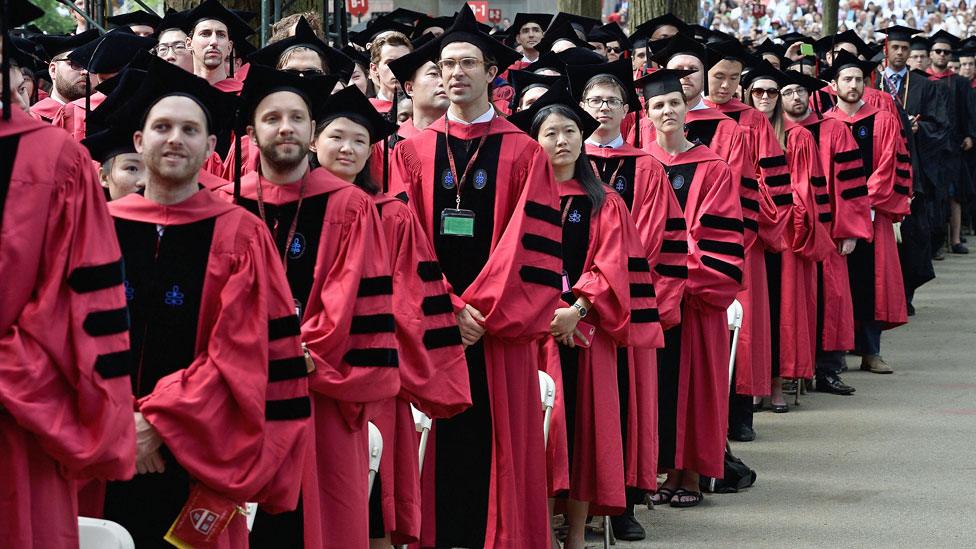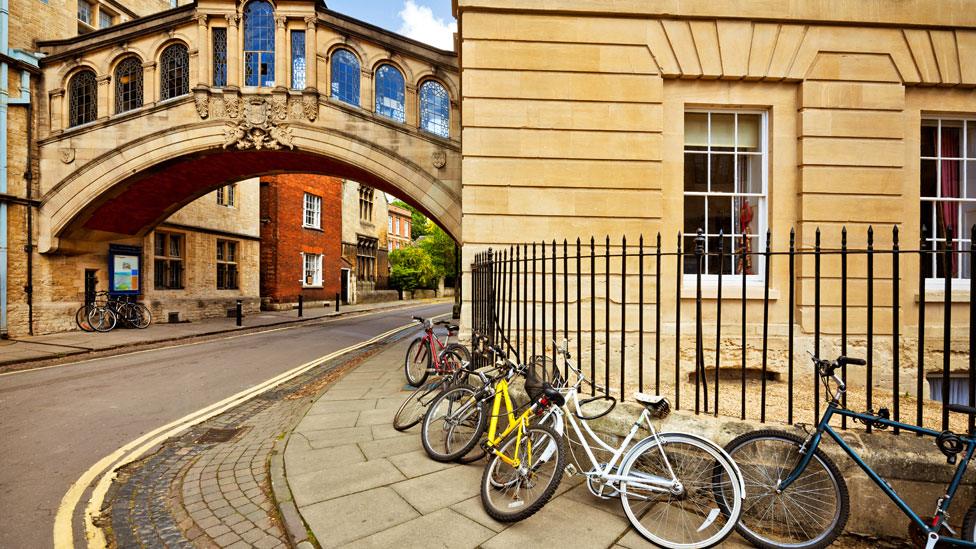UK global university ranking Brexit warning
- Published
- comments

The compilers of university rankings have warned that the UK's strong performance in international league tables could be adversely affected by Brexit, if access is disrupted to European funding and research partnerships.
The latest QS World University Rankings have been published - showing the top rated universities in individual subjects, external.
UK universities are in first place in 13 out of 48 subject rankings, three more than last year. And the UK is second, behind the United States, in the number of universities ranked highest in their specialist area.
But Ben Sowter, director of research for the QS rankings, warned that such high rankings for UK universities had often depended on European partnerships.
"Much of the highly cited research that has contributed to UK success this year will have come about as a result of collaboration with EU universities and as a consequence of participation in EU schemes," said Mr Sowter.
He said the UK's league table success reflected the benefits of belonging to European research networks, such as Horizon 2020, and study-abroad schemes, such as Erasmus.
"As our date for departure approaches," said Mr Sowter, "this year's results serve as a reminder of the enduring value provided by close collaboration with researchers, universities, and industry across the world."
Specialist strengths
UK university heads last month signed a joint letter warning that it could take them "decades to recover" from a no-deal Brexit.
They raised concerns about losing EU academic staff and students and missing out on a forthcoming £90bn pot of European research funding.
But the government has said it wants to negotiate future access to European research networks and to protect exchange arrangements for students.

Loughborough University is ranked highest in the world at sport
These latest rankings show the performance of more than 1,200 universities around the world, broken down into individual subject areas.
While annual overall rankings tend to be dominated by the same handful of universities, these subject-based rankings show institutions with specialist strengths.
Harvard and the Massachusetts Institute of Technology, both in the US, still take the most top places, dominating many of the science, engineering and technology subjects.
Of UK universities, Oxford has the most top places, including English literature, geography and archaeology, while Cambridge is top for anatomy.
But this subject-based ranking has a much wider range of names.
For sports-related subjects, the world leader is the UK's Loughborough University, in Leicestershire, followed by the University of Queensland, in Australia.
This puts the spotlight on Loughborough's world-beating strength in sport - while in the overall QS World University Rankings, the university does not make it into the top 200.

Harvard University has most the top rankings in subjects
The Royal College of Art, in London, is top for art and design. And for architecture, the best is the Bartlett School of Architecture, part of University College London.
The Royal College of Art's vice-chancellor, Paul Thompson, said it was recognition for the achievements of a "small, specialist research-intensive" institution.
The London School of Economics is in first place for social policy, while the University of Sheffield is rated second in the world in library and information management degrees, behind the University of British Columbia, in Canada.
For nursing, the University of Pennsylvania, in the US, and King's College London are the highest ranked.
In hospitality and leisure, the top two are the Ecole hoteliere de Lausanne, in Switzerland, and the University of Nevada, in Las Vegas.
US most top places
The Institute of Education, part of the University College London, is top in education and the University of Sussex is highest ranked for development studies.
When it comes to philosophy, the University of Pittsburgh is top rated, followed by Rutgers, the State University of New Jersey, both in the US.

Oxford has the most top rankings among UK universities
In performing arts, the top two are the Julliard School, in the US, and the University of Music and Performing Arts, in Vienna.
For dentistry, the Karolinska Institute, in Sweden, is in top place, followed by the Academic Centre for Dentistry Amsterdam, in the Netherlands.
The Dutch have top place for communications, with the University of Amsterdam. And for classics, the best is Sapienza, University of Rome.
But, overall, the rankings, based on the top 200 for each subject, show US universities taking most places.
The UK is in second place, followed by Australia, China and Germany.
Universities Minister Chris Skidmore said that in an "increasingly competitive global market" UK universities were still attracting EU students.
"The latest UCAS data shows that overall the numbers of applicants and acceptances from EU nationals to full-time undergraduate higher education were both higher than in 2017, with the number of acceptances from the EU at a record high," he said.
In terms of reassurances for EU academic staff, the Department for Education said all EU citizens resident before the end of 2020 can apply to the "EU Settlement Scheme", which is being "piloted with the higher education sector".

More from Global education
The editor of Global education is Sean Coughlan (sean.coughlan@bbc.co.uk).